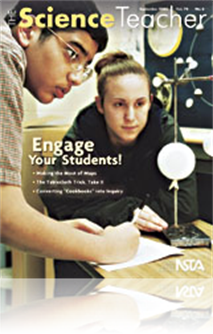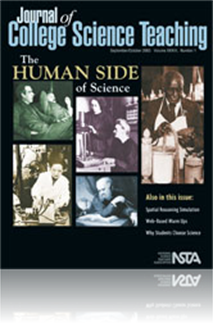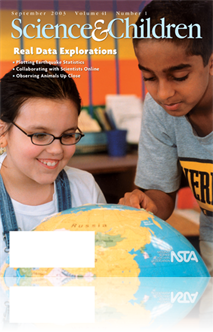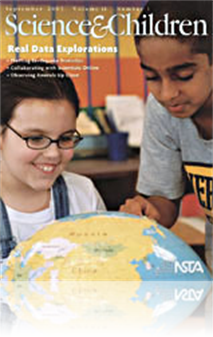All Resources
Journal Article
Better Books, Better Science Teaching
In aiming to create a scientifically literate society, teachers are being asked to present science in a variety of new ways. Science is no longer to be seen primarily as a collection of facts and concepts, but rather, as a process of inquiry and disc...
Journal Article
This standard lesson on identifying salt and sugar crystals expands into an opportunity for students to develop their observation, questioning, and modeling skills. Although sugar and salt may look similar, students discovered that they looked very d...
Journal Article
Student activities illustrate the importance of light and color in space exploration. By exploring the electromagnetic spectrum with powerful and specialized telescopes, scientists can tackle some of the most fundamental human questions: “Where did...
Journal Article
Astronomers can use light from stars to determine the elements in a star, but how do they determine the quantity/amount of these elements within a specific star?Why do we always see the same side of the Moon from Earth? Find the answers in this artic...
Journal Article
Eyes on Planet Earth! Exploring Your Local Watershed
Encourage students to investigate their local watershed and become involved in assessing and monitoring the quality of water with the help of this month's poster from the American Geological Institute. ...
Journal Article
Home Connections: Demystifying Mixtures
The subject of chemistry makes most people think of an elaborate laboratory, but investigating chemistry concepts does not require expensive equipment or chemicals. You can perform some of the same tests scientists do using materials in your home. On...
Journal Article
A Native Species Restoration Project
Get your students involved in the community by researching, collecting, growing, and re-introducing native plants to your area. Find out how students in Arizona landscaped their community using plants that required very little water—a technique kno...
Journal Article
Editor's Corner: Keep It Simple!
The Science Teacher’s editor shares thoughts on the current issue that is packed with ideas on using inquiry effectively and "Keeping It Simple."...
Journal Article
Research and Teaching: Preparatory Versus Practice Homework
The appropriate use of homework is unclear. The authors compared the performance of students who did two different types of homework—preparatory (before class) and practice (after class). They also tested student performance against that of previou...
Journal Article
Fun with Buoyancy: Students gain insight on Archimedes' principle through a novel buoyancy lab
Through a novel buoyancy lab, students learn and sharpen skills in measurement and gain insight on Archimedes' principle. This activity provides an engaging method for getting the buoyancy concept across to students and is an excellent vehicle for in...
Journal Article
Coordinating Physics and Education Instruction
This article describes a university science course that integrates physics, education, and community outreach. The class both improves student mastery of science and teaching as well as addresses the university’s mission to pursue research, educati...
Journal Article
Density on Dry Land: Demonstrations without buoyancy challenge student misconceptions
Alternative activities without buoyancy explore density with solid materials and challenge student misconceptions. ...
Journal Article
Gain rich perspectives about the interrelationships between science, technology, and society through explorations of history and the process of science. ...
Journal Article
Science Sampler: Using graphic organizers
The use of graphic organizers is an effective tool for improving students' ability to extract important information from expository text....
Journal Article
Do females and males choose science for different reasons? The authors surveyed 271 college students in the gender-neutral field of biology to learn when they became interested and what factors determined their origin and maintenance of interest in b...
Journal Article
From Magic Show to Meaningful Science
Demonstrate the power of a discrepant event to show how scientists can't always trust their own eyes in gathering information. ...
Journal Article
Real Earthquakes, Real Learning
One teacher took her class on a year long earthquake expedition. The goal was to monitor the occurrences of real earthquakes during the year and mark their locations with push pins on a wall-sized world map in the hallway outside the science room. T...
Journal Article
If red blood cells do not have nuclei, how do forensic specialists conduct DNA fingerprinting? How did Avogadro ever come up with the word “mole” to use as his unit of counting atoms?Find the answers in this article....
Journal Article
Science Sampler: Potato candle
Demonstrating a candle made of a potato and a nut is a good way for students to understand the difference between observations and inferences....
Journal Article
Rethinking Laboratories: Tools for converting cookbook labs into inquiry
An inquiry analysis tool and adaptation principles help teachers evaluate and adapt laboratories to be more inquiry-oriented. ...
Journal Article
Scope on Safety: Prudent practices in the stowing of laboratory chemicals
This column shares safety information for your classroom. In this month’s issue the author discusses the importance of a prudent and manageable chemical storage program....
Journal Article
Inquiry-based learning requires students to think about what they are doing before and during the experiment and provides opportunities to apply previously learned concepts to new situations. In this article, students determine the molar volume of a ...
Journal Article
After the Bell: Museums as inquiry role models
Informal science learning environments can provide students with the opportunities to engage, explore, explain, elaborate, and evaluate topics related to science....
Journal Article
Collaborating with WISE Scientists
Through an interactive partnership, fifth-grade students collected data on plants and joined an active scientific community of working scientists. This Web-based Integrated Science Environment (WISE) project involved asking questions about plants, gr...
Journal Article
An innovative zoo outreach program, Our Zoo to You, places zoo animals in local classrooms for extended observation periods. With guidance and support from zoo staff, students are able to safely experience a variety of animals, including geckos, sna...









